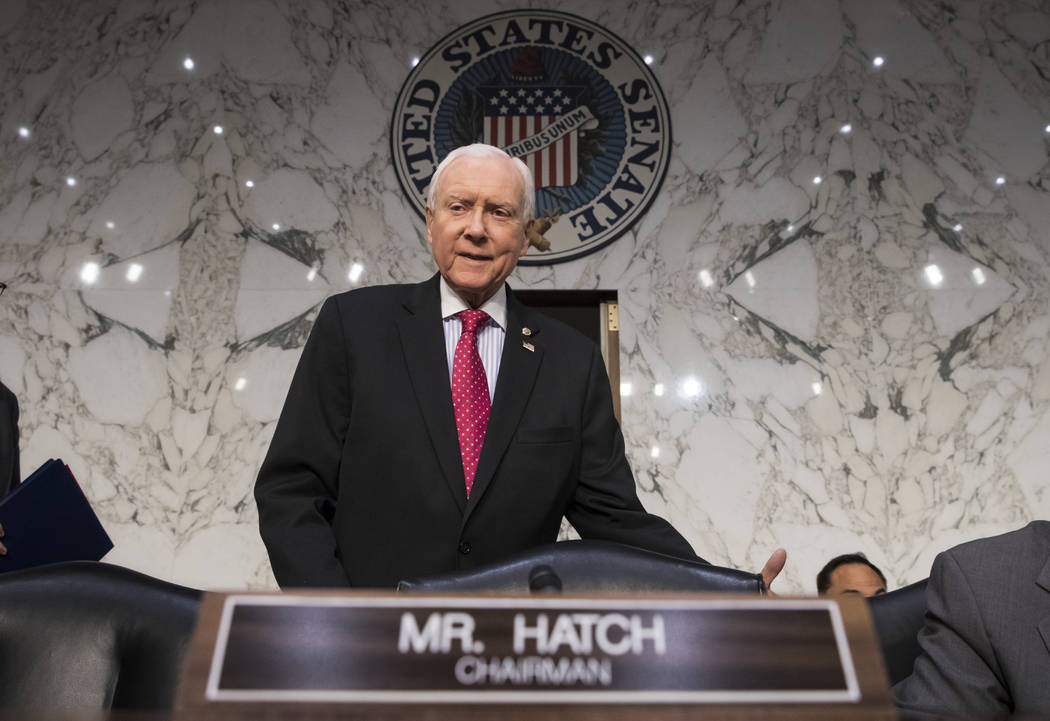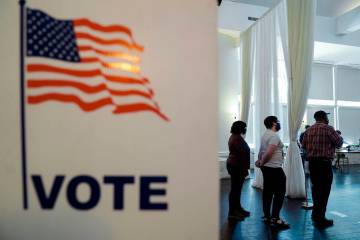House set to vote on GOP tax bill, but Senate measure faces opposition
WASHINGTON — Republicans in the House and Senate barreled ahead Wednesday on tax reform legislation amid cries from Democrats that a proposal to eliminate an Obamacare mandate would raise insurance costs and further punish middle-income families.
Despite the rifts over differences in the House and Senate bills, and opposition by Democrats to both pieces of legislation, GOP leaders expected the House to vote on a bill Thursday and a Senate committee to advance its bill this week.
Wisconsin’s Ron Johnson on Wednesday became the first Republican senator to say he opposes his party’s tax bill, signaling potential problems for GOP leaders. Besides Johnson, Republican Sens. Susan Collins of Maine, Jeff Flake of Arizona and Bob Corker of Tennessee also have been critical of the measure.
A hearing in the Senate Finance Committee began with bickering as Chairman Orrin Hatch, R-Utah, unveiled his bill, which would eliminate the individual mandate in the Affordable Care Act that requires people to purchase health insurance or face an IRS penalty.
“The individual mandate isn’t just any tax, it’s a terribly regressive tax that imposes harsh burdens on low- and middle-income taxpayers,” Hatch said.
Eliminating the tax would raise $318 billion over 10 years.
A Congressional Budget Office analysis found repeal of the mandate would result in 13 million fewer Americans with health insurance in 2027 and an increase in premiums by 10 percent.
Sen. Ron Wyden, D-Ore., the ranking Democrat on the committee, said Republicans were funding corporate tax cuts by raising premiums on middle-class families and “ripping away health care altogether from millions more.”
“This is a con job on the American people,” Wyden said.
Heller backs ending mandate
Sen. Dean Heller, R-Nev., said he supports eliminating the mandate.
Heller said 70,000 Nevada residents paid the IRS a tax penalty in 2015, and 80 percent, or 56,000 people, made less than $50,000.
“It doesn’t make sense that the federal government is fining people who cannot afford a product they are forced to buy,” said Heller, a member of the Finance Committee.
A poll released Wednesday by the nonpartisan Kaiser Family Foundation found that 55 percent of Americans support eliminating the mandate while 42 percent oppose elimination. Most Republicans, 73 percent, and 58 percent of Independents support ending the mandate, while 59 percent of Democrats oppose it.
The House bill does not contain the ACA individual mandate repeal.
Both the House and Senate bills would limit or repeal the federal deduction for state and local income and sales taxes. But the bills double the standard deduction used by most Americans filing federal taxes.
The House bill would eliminate tax credits for solar and geothermal energy and deductions for medical expenses and student loan interest, among other items. Democrats said the elimination of the deductions puts billionaires and corporate profits ahead of working families.
Rep. Jacky Rosen, D-Nev., offered six amendments to prevent the elimination of deductions. None were adopted in the House bill.
Rosen said “Nevadans deserve a simpler, fairer tax code,” but instead will be subjected to partisan legislation that “eliminates a number of common sense tax relief policies.”
Rosen is seeking the Democratic nomination for the Senate seat currently held by Heller.
Many of the deductions Rosen sought to keep are preserved in the Senate version of the bill.
Heller also tucked an amendment into the Senate bill that would raise the child tax credit to $2,000 from $1,650.
Heller said “an enhanced child tax credit is a significant way to deliver this much-needed and overdue relief to thousands of Nevada families.”
Another amendment by Heller that would make it easier for startups and businesses to award stock options to employees also was included in the Senate bill.
GOP under pressure to pass bill
Republicans are under pressure to deliver a legislative victory to President Donald Trump after the public failure to repeal the ACA, which GOP lawmakers had pledged to do since the health care bill became law in 2010.
Reform of the tax code would be the first major overhaul in 30 years, and it would provide Republicans a victory to run on in the 2018 elections.
Trump has worked behind the scenes to build support for tax reform, which would drop the corporate tax rate from 35 percent to 20 percent, a measure the president said would spur job growth.
The bill is largely expected to pass in the House on Thursday, before lawmakers recess for the Thanksgiving week holiday.
The Senate Finance Committee is expected to advance its version of the bill to the full Senate this week, setting up a floor vote when the Senate returns from its week-long recess.
Overall, the tax cuts proposed would add $1.5 trillion to the debt over 10 years.
GOP leaders are pushing the bills through Congress under special budget rules that allow passage with a simple majority in both legislative chambers. To keep the Senate version in compliance with budget rules, Hatch modified the bill this week to end personal deductions in 2025.
Republicans hold a slim 52-48 majority in the Senate. With solid Democratic opposition, GOP leaders can afford to lose only three Republicans to pass the bill with Vice President Mike Pence casting a deciding vote.
Johnson, of Wisconsin, told the Wall Street Journal he opposes the GOP bills because they help large corporations but give less to smaller businesses. Johnson did not rule out supporting a modified bill addressing that concern.
Corker and Flake have criticized the tax bill because of the increase to the national debt, but have not said how they will vote. Collins has raised concerns about the repeal of the individual mandate under the ACA.
The National Committee to Preserve Social Security and Medicare said the bills would “blow a hole” in the deficit and force a $25 billion reduction in Medicare spending.
Rep. Dina Titus, D-Nev., said those cuts would “shift the burden to state and local governments and leave Nevadans without vital resources.”
“We need a tax plan that provides relief to families instead of crushing them,” Titus said.
Contact Gary Martin at gmartin@reviewjournal.com or 202-662-7390. Follow @garymartindc on Twitter.
Senate restrictions
Senate rules allow the tax cut bill to raise the deficit by no more than $1.5 trillion over 10 years. The Senate is also prohibited from passing a bill that would add to the deficit after 10 years unless there is bipartisan support. That's because the chamber is trying to pass the tax cut measure through a process known as "reconciliation," which allows changes with just a simple majority of votes in the Senate. Otherwise, they need 60 votes to pass a broader bill, and Republicans only control 52 of the Senate's 100 seats.




























